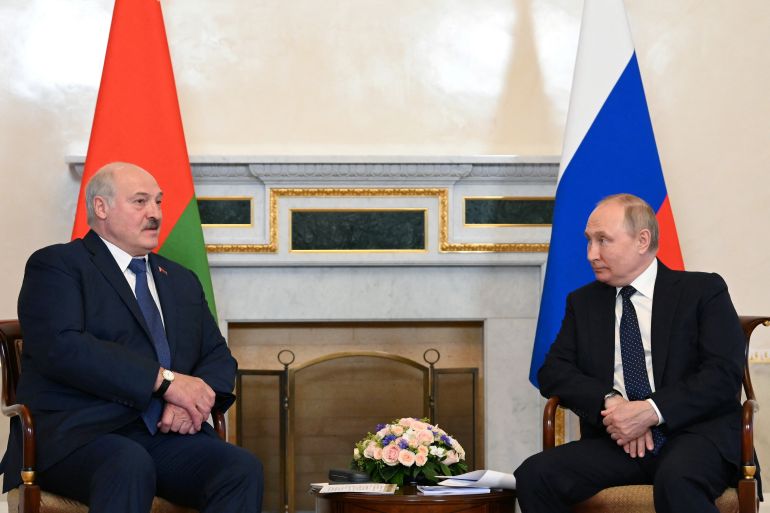Russia to send Belarus nuclear-capable missiles within months
Putin has several times referred to nuclear weapons since his country invaded Ukraine on February 24 in what the West has seen as a warning not to intervene.

Russia will supply Belarus with missiles capable of carrying nuclear warheads after the president complained about nuclear-armed NATO flights coming close to the Belarusian border.
President Vladimir Putin made the announcement on Saturday as he received Belarusian leader Alexander Lukashenko in Moscow.
Keep reading
list of 4 itemsPoland-Belarus border: The people pushed back in a Polish forest
Belarus urges Russia-led military alliance to unite against West
UEFA moves to keep Ukrainian, Belarusian football teams apart
“In the coming months, we will transfer to Belarus Iskander-M tactical missile systems, which can use ballistic or cruise missiles, in their conventional and nuclear versions,” Putin said in a broadcast on Russian television at the start of his meeting with Lukashenko in St Petersburg.
At the meeting, Lukashenko expressed concern about the “aggressive”, “confrontational”, and “repulsive” policies of Belarus’s neighbours Lithuania and Poland.
He asked Putin to help his country mount a “symmetrical response” to what he said were nuclear-armed flights by the US-led NATO alliance near Belarus’s borders.
Putin offered to upgrade Belarusian warplanes to make them capable of carrying nuclear weapons amid soaring tensions with the West over Ukraine.
Last month, Lukashenko said his country had bought Iskander nuclear-capable missiles and S-400 anti-aircraft anti-missile systems from Russia.
“Many Su-25 [aircraft] are in service with the Belarusian military. They could be upgraded in an appropriate way,” Putin said.
“This modernisation should be carried out in aircraft factories in Russia and the training of personnel should start in accordance with this. We will agree on how to accomplish this.”
Putin has several times referred to nuclear weapons since his country invaded Ukraine on February 24 in what the West has seen as a warning not to intervene.
Moscow has alleged that NATO planned to admit Ukraine and use it as a platform to threaten Russia.
Russia’s move has not only triggered a barrage of Western sanctions but also prompted Sweden and Russia’s northern neighbour Finland to apply to join the Western alliance.
In the past week, Lithuania in particular has infuriated Russia by blocking the transit of goods subject to European sanctions travelling across its territory from Russia, through Belarus, to Russia’s Baltic exclave of Kaliningrad.
Russia called it a “blockade” but Lithuania has said it affects only 1 percent of the normal goods transit on the route and passenger traffic is unaffected.